Charade is a game suitable for all ages, in which you have to mimic words or phrases written on paper tickets. The goal is to make your teammates guess the answer using only gestures. That's right: when a player mimes the sentence, he can't speak! This game requires little preparation, a lot of imagination and is sure to make you laugh!
Steps
Method 1 of 3: Prepare the Game
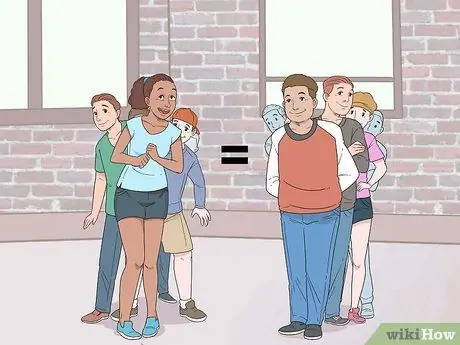
Step 1. Divide the players into two equal teams
In reality it is not necessary that the teams have the same number of players, but if there are more people it becomes easier to guess. Once the teams are established, you need to split into two rooms, or at least arrange yourself on opposite sides of a room.
- Alternatively, you can try a less competitive variant of the game, where everyone can guess the word to mime. The guesser will have to mime the following word.
- If you don't play in teams, the mimic can choose a word for himself. This simplifies the game, as you will no longer need slips of paper.
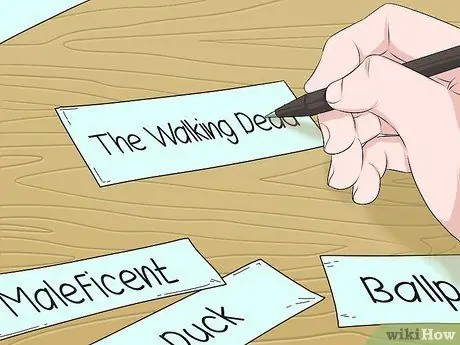
Step 2. Write phrases or words on paper cards
Now that the teams are in two different rooms (or at least on opposite sides of a room), write common words or phrases on some slips of paper in pencil or pen. Keep the Secret! You will have to give these sentences to the opposing team, who will have to choose one at random to guess.
- There are 6 common categories in traditional play: books, movies, TV shows, songs, plays, and famous quotes or phrases.
- In general, long sentences or sentences in foreign languages are not allowed. If in doubt, ask your peers for advice. If at least half of them have already heard that phrase, it will be fine.
- Don't write a single proper name on the piece of paper. Without any context, if a player doesn't know who that person is, they won't be able to mimic it.
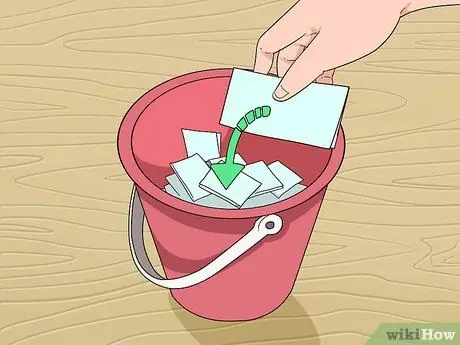
Step 3. Fold the cards in half and place them in a container
You are almost ready to start. Fold all the notes in half so that the word or phrase remains hidden. Put them in a container and ask the teams to gather again in the room where you will play. Exchange the containers, but don't look at the cards!
The most used containers are baskets or hats, but if necessary you can use creativity. Grab an empty drawer from a coffee table or use a pillow case
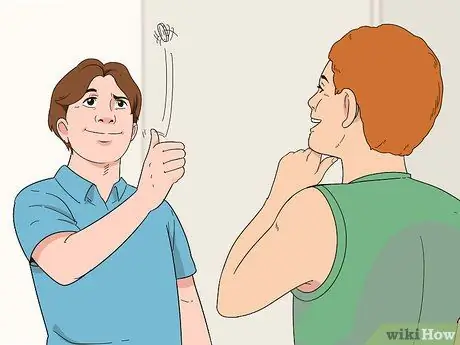
Step 4. Determine who will start with the coin toss and set a time limit
Do heads or tails (or something similar) to decide which team will be the first to play. Usually each heat has a time limit, but you can decide it based on the age and skill of the participants. Two minutes is a good time to start.
- If it is not a problem that the heats last a long time, you can not impose time limits. In this case the teams can try to guess until they give up.
- At this point you can decide what the penalty will be when the mimicking player speaks. For example you can give a half point penalty or cancel the run.
Method 2 of 3: Start Playing
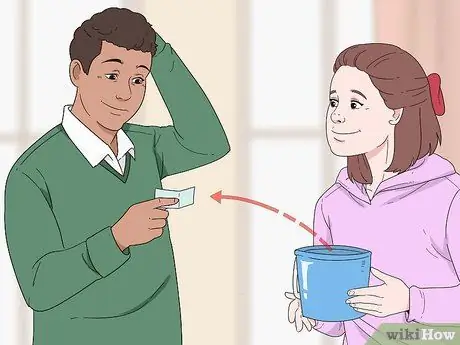
Step 1. The starting player must draw a ticket
The team that won the coin toss will begin, choosing the player who mimics first. All members of a team must mimic at least once before a person does it twice.
If you can't find an agreement on who should start, decide with a quick paper, scissor, stone tournament who will draw the card first
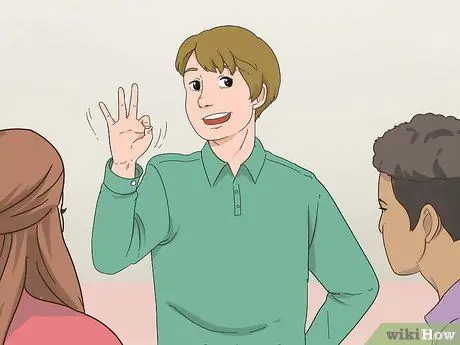
Step 2. Communicate general information to help your team narrow down the possibilities
The category and number of words in the sentence give your classmates a clearer idea of what they have to guess. You can invent gestures yourself, but usually:
- At the start of the turn, indicate the total number of words with your fingers.
- The next number you will show indicates the first word you will mimic.
- By indicating a number on your arm, you communicate how many syllables the word is made up of.
- By spreading your arms and waving them in the air you indicate "the whole concept".

Step 3. Mimic the words until your team guesses or your time runs out
Some gestures that are unequivocal to you will not be recognized by anyone. Don't wait too long to change your strategy - the more clues you give your team with gestures, the sooner they'll be able to guess.
- When your team guesses correctly, the round ends and your team receives a point. The other team will have to repeat the process.
- If your team does not guess right and the time runs out, you have to pass the round without receiving a point and the game passes to the opponents.

Step 4. Play until the cards run out or a clear winner is established
If you are having fun with your friends, you don't have to stop when they run out of guessing sentences! Divide and write more. In some cases the teams can be unbalanced, because some players are very good. If necessary, mix them up to make the games more close-knit.
Method 3 of 3: Learn the Most Common Gestures
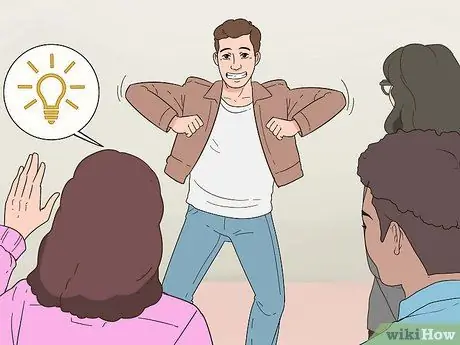
Step 1. Discuss common gestures to use with all players
These gestures allow you to express the concepts that must be communicated in all shifts, such as the category, so as to immediately take action. However, it's not fair to use them if some players aren't familiar with them, so explain them to everyone before you get started.
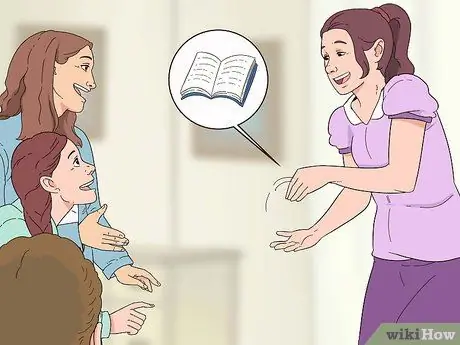
Step 2. Communicate the category with standard gestures
Since all words or phrases fall into one category, it is useful to establish standard gestures to express them. This way you won't have to waste time thinking about an original gesture and you can concentrate on making people guess the words written on the note.
- Point to books by opening your hands, as if opening a book.
- For movies, it mimics the action of turning an old hand-cranked camera.
- Draw a square or rectangle in front of you to indicate a TV show.
- Pretend you're singing (without actually doing it) for the songs.
- Pull a rope to open a curtain for the plays.
- Make the quote gesture with your fingers if you need to mimic a famous quote or phrase.

Step 3. Encourage those who come close to the answer
When a teammate is on the right track, they show excitement on their face. Use your hands or fingers to indicate that he is close to us. To discourage those who have not understood, point at it and shake your head or make an X with your arms.
- If a teammate is on the right track and it seems to you that he is going to guess the answer, mimic the gesture of approaching him or turn his hands in a circle.
- Moving your hands away usually means "more", but in some cases it can also indicate that the word is "bigger", for example because it has a prefix or suffix.

Step 4. Guide teammates to the correct tense or correct word form
In some situations a partner will guess the right word, but not the time, or he will say it in the singular instead of the plural. When a partner comes very close to the answer, indicate it, then:
- Join the little fingers to indicate that the word is plural.
- Wave your hand behind you to point to the past. Do the opposite for the future.
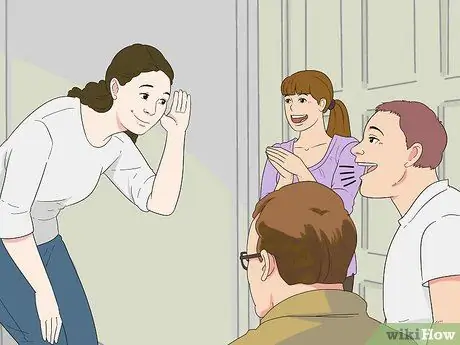
Step 5. Use similar words to your advantage
By putting your hand to your ear, you signal to your team that you are miming a word that resembles the answer. After that gesture, you can point to your nose to mimic the word "case".

Step 6. Improve the game with experience and speed
If you can make clear gestures faster, your team will get to the answer first. Practice playing charades often, so that your gestures become natural and you don't have to spend too much time thinking.






